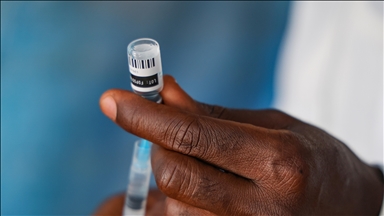WHO identifies 17 pathogens urgently needing new vaccines
HIV, malaria, and tuberculosis continue to top list as major global threats, says WHO official, adding that study also seeks more attention to pathogens such as Group A streptococcus, Klebsiella pneumoniae

GENEVA
The World Health Organization (WHO) said on Tuesday that it had identified 17 pathogens for which new vaccines are urgently needed as they frequently cause disease.
Mateusz Hasso-Agopsowicz, WHO technical officer and project manager for vaccine product and delivery research, told a UN briefing in Geneva that the new study identifying the pathogens marks the "first global effort" to systematically prioritize endemic pathogens based on their impact on regional and global health.
"The findings reconfirm some long-standing vaccine priorities," he said, adding that HIV, malaria, and tuberculosis continue to top the list as major global threats – collectively causing 2.5 million deaths a year.
However, he said, the study also seeks to draw more attention to pathogens such as Group A streptococcus, which causes severe infections and contributes to 280,000 deaths from rheumatic heart disease, mainly in lower-income countries.
"Another example of a new priority is Klebsiella pneumoniae – a bacteria that was associated with 790,000 deaths in 2019, and is responsible for 40% of neonatal deaths due to blood infection (sepsis) in low-income countries," he added.
In a statement, the UN agency said the new global priority list of endemic pathogens supports the Immunization Agenda 2030’s goal of ensuring that everyone, in all regions, can benefit from vaccines that protect them from serious diseases.
WHO listed Group A streptococcus, Hepatitis C virus, HIV-1 and Klebsiella pneumoniae as pathogens where vaccine research is needed.
On pathogens where vaccines need to be further developed, it listed Cytomegalovirus, influenza virus (broadly protective vaccine), Leishmania species, non-typhoidal Salmonella, Norovirus, Plasmodium falciparum (malaria), Shigella species, and Staphylococcus aureus.
It classified Dengue virus, Group B streptococcus, extra-intestinal pathogenic E. coli, Mycobacterium tuberculosis, and Respiratory syncytial virus (RSV) as pathogens where vaccines are approaching regulatory approval, policy recommendation, or introduction.
Anadolu Agency website contains only a portion of the news stories offered to subscribers in the AA News Broadcasting System (HAS), and in summarized form. Please contact us for subscription options.







